The Importance of Colostrum in Dogs [Veterinarian Explains]
Colostrum is a food supplement for dogs, livestock animals and humans. There are many health claims to this supplement, from allergy management to treatment of infectious diseases. This is the reason why it has an increasing popularity nowadays. While it may not be applicable to all dogs, studies suggest that colostrum is a very potent immune booster. In this article, we will discuss colostrum and its associated health claims.
What is Colostrum?
Colostrum is the first milk produced by a mother dog during the first two days after birth. It is special because it contains high levels of beneficial nutrients such as immunoglobulins, antimicrobial peptides and growth factors. These nutrients are important in supporting the growth, development and immunity of newborn puppies.
In most cases, colostrum is yellow in appearance. It also has a thicker consistency compared to normal milk. Its unique color and various health benefits led to it being known as “liquid gold”.
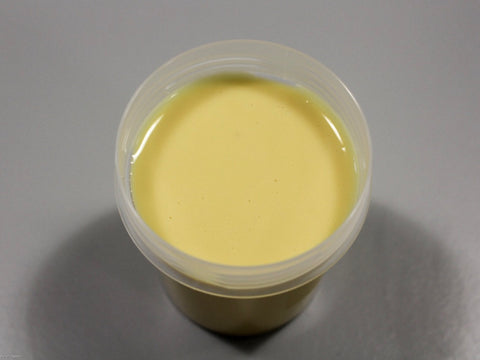
Components of Colostrum
Colostrum contains macronutrients like proteins, carbohydrates, saccharides and lipids, just like normal milk. It also has some micronutrients like vitamins and minerals. The major benefit of colostrum is the immune-aiding substances found in it. The key components of colostrum important in supporting the immune system are as follows.
Antibodies
Also known as immunoglobulins, these substances help protect newborn animals against pathogens while their own immune system matures
Growth factors
Substances that stimulate cell growth and tissue repair essential for general puppy growth
Lactoferrin
Proteins that can have antiviral, antimicrobial, antifungal and antiparasitic properties
Proline-rich polypeptides (PRP)
Also known as colostrinin, are substances that regulate the thymus and immune system to respond to pathogens, toxins or allergens
Methylsulfonylmethane (MSM)
A micronutrient that have healing and analgesic properties
Colostrum vs Milk
Colostrum differs considerably from the composition of normal milk. For instance, colostrum contains more proteins and antibodies while normal milk contains more lactose and fat. The comparison between colostrum and normal milk is illustrated in the table below.
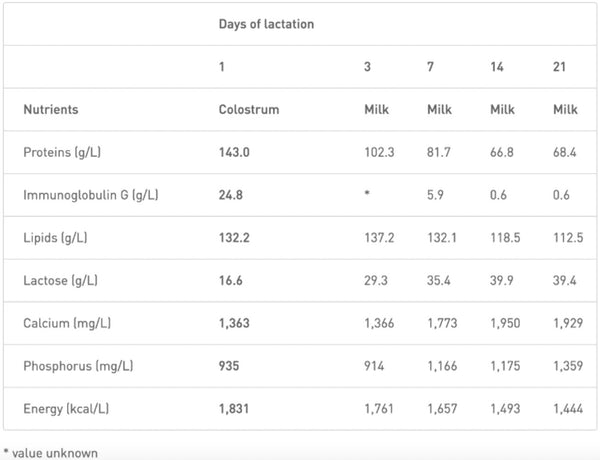
The high protein and antibody components of colostrum are beneficial for puppies. For instance, proteins have a myriad of functions in metabolism, hormone production and growth. In fact, they are the building blocks of muscle. On the other hand, antibodies absorbed from colostrum immediately help in protecting the newborn’s body from infections. This is the most important component of colostrum because a newborn’s immune system is not yet developed to fight off pathogens. Furthermore, there is a significant decline in the number of antibodies as the days of lactation increase.
Colostrum is the better choice for adult dogs compared to normal milk because of its lower lactose and fat content. Most adult dogs are lactose-intolerant and have difficulty digesting high-fat foods. Additionally, adult dogs can benefit from the proteins and antibodies found in colostrum as well. This is why colostrum is widely used as a nutraceutical treatment for animals.
Colostrum's Role in Newborn Puppies
The first two weeks of a puppy’s life are crucial because they are at high risk of dehydration, hypothermia, hypoglycemia and infections. During this time, newborn puppies rely on colostrum intake to primarily fulfill their nutritional requirements. However, colostrum plays other vital roles for the newborn puppies aside from parenteral nutrition and are as follows (Rossi, et al., 2021).
Elimination of meconium – meconium is a newborn’s first bowel movement and colostrum aids in elimination through its laxative action.
Addresses hypoglycemia – newborns have low glycogen storages at birth and colostrum serves as their major glucose source.
Extrauterine growth – colostrum contains growth factors important for this event.
Protects against hypothermia – newborns have poor thermoregulation and the high energy value of colostrum compensates for this.
Provides transfer of immunity – colostrum contains high amount of immunoglobulins important for inducing passive immunity.
The early colostrum intake of newborn puppies within hours immediately following birth is important. Upon birth, puppies are born with very low systemic immunity making them prone to infections. Colostrum plays an important role by inducing passive immunity to neonates during this time. Passive immunity is defined as a short-term protection from disease resulting from transfer of ready-made antibodies (Tizard, 2023).

It is also important to note that colostrum production and absorption are influenced by time. For instance, colostrum production decreases rapidly after birth. The colostral phase in dogs is defined as the first two days after birth (Chastant, 2023). During this phase, a dramatic decline in the amount of primary antibodies (IgG) in the colostrum already takes place. Although the immature intestinal barrier of newborn puppies allows the fast absorption of macromolecules from the colostrum, this barrier starts to close over time affecting the absorption rates of antibodies. In fact, absorption of primary antibodies (IgG) ceases 24 hours postpartum (Mila, et al., 2016).
The benefits of colostrum are not limited to newborn puppies. Studies show that bovine colostrum supplementation in adult dogs has positive nutritional and immunologic effects (Satyaraj, et. al., 2013). Giving adult dogs colostrum is a great way to support their health and longevity.
Benefits of colostrum for adult dogs.
Immune System Modulation
One of the most important benefits of colostrum supplementation is its immune-modulating effects due to its high amounts of antibodies. Some studies have found significant influence of colostrum supplementation to immune response in adult dogs. In 2013, a study concluded that dogs fed with bovine colostrum-supplemented diet demonstrated a higher vaccine response to the canine distemper virus (CDV) vaccine (Satyaraj, et al., 2013). It also discovered an increased gut-associated lymphoid tissue response by measuring fecal antibodies.
Anti-Inflammatory Properties
Bovine colostrum contains peptides, such as lactoperoxidase and lactoferrin, that have been shown to have anti-inflammatory properties (Ooi, et. al., 2023). These anti-inflammatory properties can be appreciated if colostrum is applied topically for skin inflammation or ingested for local effect in the gut, such as in the case of inflammatory bowel disease (Gollakner, 2023). There is anecdotal evidence that colostrum can be used for allergy management but it should be used with caution in animals with hypersensitivity to dairy and milk.
Digestive Health Support
Several studies have found that colostrum may have positive effects on the digestive health of adult dogs. A study in 2013 concluded that supplementing diets with bovine colostrum significantly increased gut microbiota diversity (Satyaraj, et al., 2013). It is known that gut microbiomes with good diversity and a healthy balance of bacteria can help to protect against invading pathogens. Furthermore, the same study also found that colostrum supplementation increased gut antibodies (IgA) which influence gastrointestinal immune response. A separate crossover trial done in adult male Beagles discovered improvements in protein digestibility in the group supplemented with bovine colostrum (Dequenne, et. al., 2014).
Wound and Oral Tissue Repair
Colostrum is also found to have regenerative properties. A study in 2006 concluded that bovine colostrum supplementation increased proliferation of canine skin fibroblasts (Torre, et al., 2006). This effect could be attributed to the bioactive components, such as natural growth factors, found in colostrum. Fibroblasts play an important role in wound and periodontal tissue repair. Topical preparations are found to supportively treat periodontal disease in dogs (Gollakner, 2023).
Colostrum and Specific Health Conditions
Colostrum can be given alone as a treatment to reduce the length and severity of established infections. It can also be used in conjunction with traditional treatments such as antibiotics. Here are some conditions that can benefit from colostrum supplementation.
Infectious Diseases
Colostrum can be used as supportive treatment for bacterial and viral infections. The bioactive compounds and peptide-based nutrients in colostrum can neutralize viruses and inhibit bacterial colonization (Giffard, et al., 2004). Published reports have shown that colostrum and its components are effective against a wide range of common pathogens, including Rotavirus, Cryptosporidium spp., Staphylococcus aureus, Candida spp., Clostridium spp., Shigella spp., Streptococcus spp. and E. coli (Pandey, et. al., 2011). These are pathogens commonly causing gastrointestinal and integumentary diseases.
Chronic Illnesses
The bioactive components of colostrum are known to have anti-inflammatory properties beneficial to certain chronic illnesses. In a study in 2018, bovine colostrum was found to have preventive effects on inflammatory bowel disease after experimentation on mice (Filipescu, et. al., 2018). On the other hand, there are also anecdotal evidences that colostrum supplementation is helpful to dogs with osteoarthritis. Although no direct study is available to support this, the growth factors found in colostrum had positive musculoskeletal effects on other species. Additionally, these studies concluded that bovine colostrum increased muscle strength and reduced bone resorption (Ellis, 2015).
Cancer
Bovine colostrum has been found to have efficacy in managing several cancer cell lines in humans (Alsayed, et. al., 2022). Furthermore, the bioactive components namely lactoferrin, CLA, and alpha-lactalbumin are effective in the treatment of some forms of cancer. The anti-oxidative effects of some bioactive components in colostrum may also counteract the adverse effects of chemotherapy in dogs making it a good supportive nutraceutical in dogs with cancer.
Dosage and Administration
Bovine colostrum is the most commonly used colostrum supplement for dogs and has a strong safety profile with applications across all age groups. Colostrum can be in the form of powder, capsule, chewable or enriched in commercial diets. It can be given with or without food.
Not all colostrum supplements are equal in terms of its quality. A lot of factors play a role in determining the constitution of the colostrum. Therefore, recommended dosages may differ from various manufacturers.
Here is a recommended guideline on how much colostrum you should give your dog. (based on IgG content ranging from 28-32%):
<10 kg needs ¼ teaspoon;
11-20 kg needs ½ teaspoon;
21-30 kg needs ¾ teaspoon;
31-40 kg needs 1 teaspoon;
41-50 kg needs 1 ¼ teaspoons;
51+ kg needs 1 ½ - 2 teaspoons.
The guide above is recommended for maintaining overall health. In case of an active infection or a specific health condition, the dose can be doubled. It is imperative to consult your veterinarian if your dog is taking any other medication before supplementing colostrum as adjunct therapy.
Colostrum supplementation is considered safe. There are no reported side effects aside from possible hypersensitivities and intolerance, which may include stomach upset. It is not recommended to dogs with known dairy/milk allergies.
Colostrum in Bully Max
Are you planning to start your dog on colostrum? The good news is that Bully Max offers products with colostrum! Make sure to check these ones out as you try to find what works for your dog.
Bully Max Vitality Chews for Immunity & Health - this Bully Max supplement is ideal for all ages and contains 100 mg of colostrum. It supports 9 essential areas of your dog health and is an easy-to-feed soft chew.
Bully Max Puppy Chews for Immunity & Growth - this Bully Max supplement is ideal for puppies and contains 175 mg of colostrum. It supports immune system, digestive health, and supports muscle growth.
Bully Max Puppy Tabs for Development & Growth - Another supplement formulated for puppies. It contains 50mg of Colostrum. These tabs support brain development and overall metabolic health, promotes strong bones and flexible joints.
Frequently Asked Questions
Is colostrum safe for dogs?
Yes. Colostrum is safe for dogs without known dairy/milk allergies.
How does colostrum help with allergies in dogs?
The anti-inflammatory and immunomodulatory properties of colostrum help with the reduction of symptoms associated with allergies.
What does dog colostrum look like in its natural form?
Dog colostrum is cloudy yellow in color and thick in consistency.
What are the side effects of colostrum in dogs?
The side effects of colostrum may include stomach upset in hypersensitive dogs.
Conclusion
Colostrum is a perfectly safe nutraceutical that can help maintain the general health of dogs. It can also be used as a supplementary treatment for various ailments such as allergies, arthritis, and gastrointestinal disorders. However, it is not recommended for dogs with dairy allergies.
Are you giving your dog colostrum? Share with your experience by leaving us a comment below.
References
Alsayed, Ahmad; Hasoun, Luai; Khader, Heba; Basheti, Iman; Permana, Andi Dian. 2022. Bovine Colostrum Treatment of Specific Cancer Types: Current Evidence and Future Opportunities. Molecules. DOI: 10.3390/molecules27248641
Chastant, Sylvie. 2023. Lactation in domestic carnivores. Animal Frontiers. 78-83
Chastant-Maillard, Sylvie; Mila, Hanna. 2021. Canine Colostrum. Royal Canin Vet Focus.
Dequenne, M; Robaye, V; Dotreppe, O; Neizer, C; Delhalle, L; Thonart, P; Bertrand, C; Robert B; Moinet, B; Diez, M. 2014. A supplement of bovine colostrum and probiotics increased protein digestibility in dogs but did not influence microbiome. Proceedings of the 18th Congress of the European Society of Veterinary and Comparative Nutrition
Ellis, John. 2015. Colostrum – it offers more than passive immunity.
Filipescu, IE; Leonardi, L; Menchetti, L; Guelfi, G; Traina, G; Casagrande-Proietti, P; Piro, F; Quattrone, A; Barbato, O; Brecchia, G. 2018. Preventive effects of bovine colostrum supplementation in TNBS-induced colitis in mice. PloS One. DOI: 10.1371/journal.pone.0202929
Giffard, Catriona; Mitsuro, Seino; Markwell, Peter; Bektash, Roger. 2004. Benefits of Bovine Colostrum on Fecal Quality in Recently Weaned Puppies. The Journal of Nutrition. 2126-2127. DOI:https://doi.org/10.1093/jn/134.8.2126S
Gollakner, Rania. 2023. Colostrum. VCA Animal Hospitals.
Mila, H; Grellet, A; Mariani, C; Feugier, A; Guard, B; Suchodolski, J; Steiner, J; Chastant-Maillard, S. 2016. Natural and artificial hyperimmune solutions: Impact on health in puppies. Reproduction in Domestic Animals. 163-169
Ooi, T.C.; Ahmad, A.; Rajab, N.F.; Sharif, R. The Effects of 12 Weeks Colostrum Milk Supplementation on the Expression Levels of Pro-Inflammatory Mediators and Metabolic Changes among Older Adults: Findings from the Biomarkers and Untargeted Metabolomic Analysis. Nutrients 2023, 15, 3184. https://doi.org/10.3390/nu15143184
Pandey, NN; Dar, AA; Mondal, DB; Nagaraja, L. 2011. Bovine Colostrum: A Veterinary Nutraceutical. Journal of Veterinary Medicine and Animal Health. 31-35
Rossi, Luciana; Lumbreras, Ana Elena Valdez; Vagni, Simona; Dell’Anno, Matteo; Bontempo, Valentino. 2021. Nutritional and Functional Properties of Colostrum in Puppies and Kittens. Animals.
Satyaraj,Ebenezer; Reynolds, Arleigh; Pelker, Robyn; Labuda, Jeff; Zhang, Peifang; Sun, Perchuan. 2013. Supplementation of diets with bovine colostrum influences immune function in dogs. British Journal of Nutrition. 2216-2221
Tizard, Ian Rodney. 2023. Passive Immunity in Animals. MSD Manual Veterinary Manual. NJ USA
Torre, Celina; Jeusette, Isabelle; Serra, Montserrat; Pilar, Brazis; Puigdemont, Anna. 2006. Bovine Colostrum Increases Proliferation of Skin Fibroblasts. The Journal of Nutrition. 2058-2060

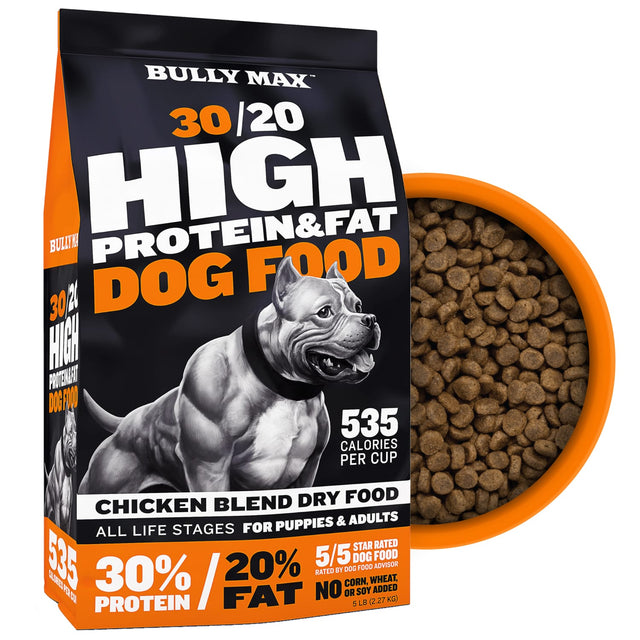
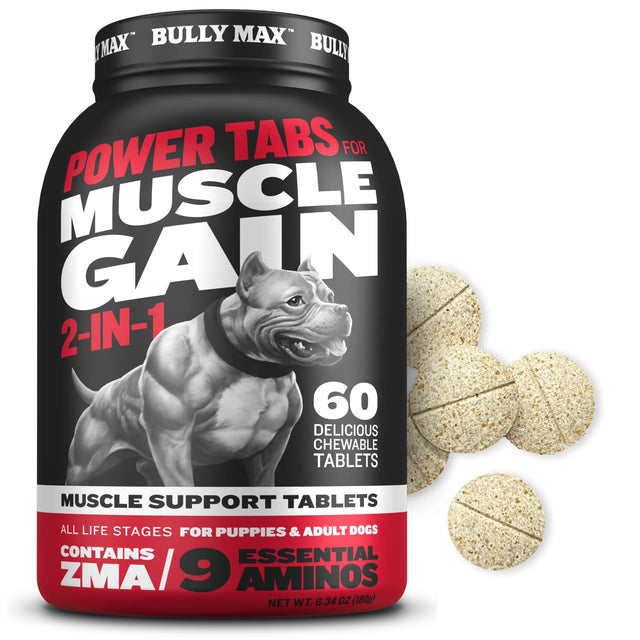
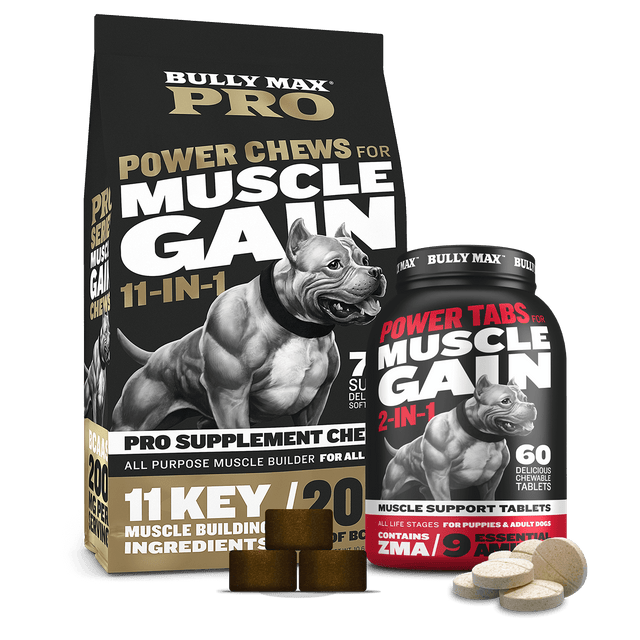
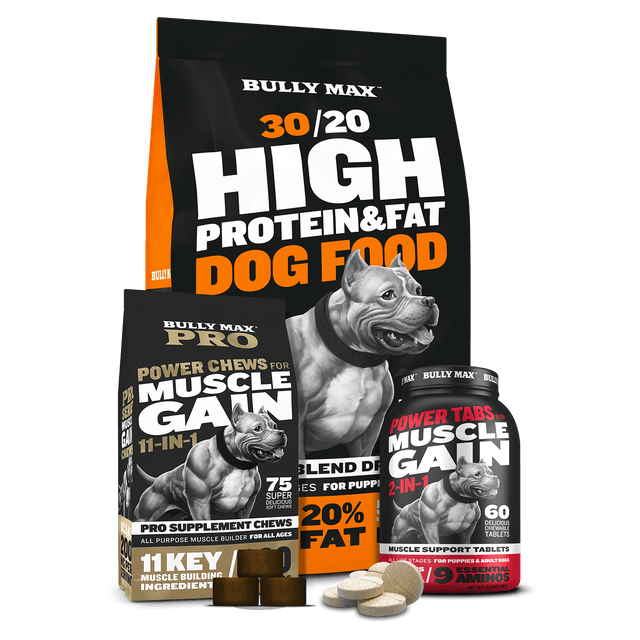

![How to Train a Search and Rescue Dog [Dog Trainer Explains]](http://shop.bullymax.com/cdn/shop/articles/Search_and_Rescue_Dogs_in_dog_training_court.jpg?v=1713867590&width=400)

